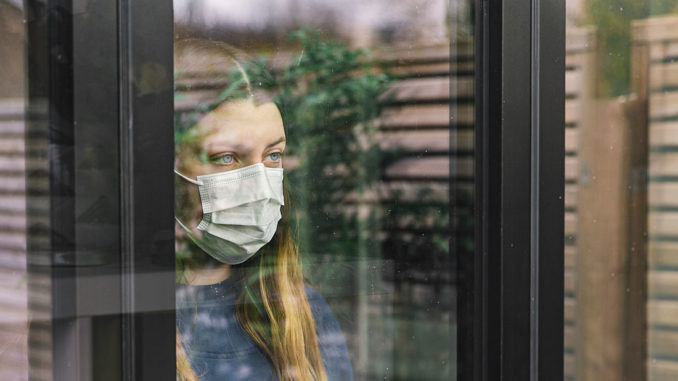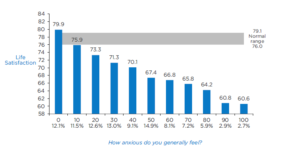
“Goodbye, friend, I hope I will be different when I come back.” Karen whispered to me at the airport’s departure lounge. The airport was particularly deserted during the epidemic. She picked up her handbag from the ground, waved her hand, and walked into that channel, her back looks less heavy.
Karen’s sudden decision to return to China is related to the epidemic, but behind it is the increasingly serious psychological problems of international students. A new report on mental health indicators from The Pie News found that a quarter of Australian international students are facing enormous psychological pressure.

Davorin Vrdoljak, vice president of operations at QS Admissions Solutions, explained: “Students may have a degree of anxiety, and they will think ‘how will I learn, how will I live in a country where English is not my first language.'” “Before they came to Australia, these international students began to experience higher psychological pressure.
The neglected international student community VS the growing psychological problems of international students
The “Mental Health Survey of International and Overseas Students” published by insurance companies Bupa and QS Enrolments Solutions found that more than 12,000 respondents were twice as likely to experience extremely low life satisfaction as Australian adults. International students are at higher risk of depression or suffering depression than Australian adults.

The sociodemographic and political environment may expose the people and citizens of these countries to greater challenges than their residents in Australia. The more disappointing reality is that according to the QS registered international student survey, the report states explicitly that in many countries, depression and mental health problems are often considered a shame, which means that students ’ability to identify potential dangers is reduced or the ability of students to discuss and seek help is reduced.
Just a few months ago, people discussed topics around “Where to play on the weekend”, “How is the speech prepared next week?”, “Family going to the suburbs to watch the sea.” Now, we are only talking about COVID-19. Under the epidemic, the Australian government’s series of lockdown measures has brought new challenges to international students with psychological problems.
International students under pressure during the epidemic
“The lockdown policy is like taking risks and putting them in a pressure cooker situation, depriving them of social and other resources, such as familiarity.” Peter Hayton described the current status of international students.
“I know my depression has been with me for a long time. I used to play basketball to adjust my mood, but now all outdoor activities are gone.” Henry said in an interview. “My only pleasure is gone.” For international students with psychological problems, a small thing that makes them happy can be valuable.
Similar to Henry, many international students choose to complete their studies in Australia. Still, some people choose to suspend their studies and return to their own countries.
Karen, currently studying at the University of Sydney, has experienced a series of mental problems due to past emotional factors. During the lockdown in Australia, she finally chose to return home. “I can’t stay here anymore. I tried hard, but it seemed to be useless,” she replied in the interview.
Everyone had to adapt to the “new normal suddenly”. Initially, the general public assumed that international students would take it in stride. Isn’t it a different way to take classes, live, eat, and stare at your mobile phone, except that you don’t have to go to school to take courses, will there be any difference in “home refuge”?

The conclusion is very different. After implementing a home isolation policy for a period of time, Karen told me about her mental journey (mostly sad mood). She said: “I’m trying to adapt to the days in the room.” The unsuccessful aspects made her more and more psychologically burdened. “The epidemic has become more and more severe, and I was anxious. The school has become an online class, and temporary accommodation is also very uncomfortable.
Karen’s home stores a large number of various mental medicines
We must calmly face the reality that international students are not capable of coping with this crisis. In fact, those international students who are already mentally ill are in a much worse situation than ordinary people. As Christine L. Carter, author of Psychology Today, points out: “Adolescents and college students amplify their internal and developmental motivations, which makes it difficult for them to be isolated at home. ”
How to help international students get out of the plight of psychological problems?
Peter Hayton, clinical director of The Banyans in Sydney, provided some advice. The Banyans is a mental health treatment center. He said: “People are used to making psychological hints through the reactions of those around them. Don’t worry too much about the new crown virus. You can pay attention and care, but more importantly, live in the moment.” For those students with serious psychological problems, they should pay attention not only to their own mental health problems but also pay attention to the issue of COVID-19, which undoubtedly increased their concerns.
Peter Hayton also suggests trying to create as many new experiences as possible in the daily lives of international students: chasing the dog on the park lawn, exercising, cooking a meal, playing online games with friends, etc.
In addition to this, Bupa ’s findings indicate that universities and institutions should pay attention to their international student population and the mental health risks they experience.
Mental health has become an important topic in international education. Australian universities are improving students’ understanding and use of mental health services, paying more attention to intervention techniques, issuing first-aid certificates of mental health to teachers, and conducting further research on mental health.
At present, the University of Sydney, the University of western Sydney and other Australian universities have issued a series of policies to solve students’ psychological problems.
In addition to psychological counseling provided by some Australian institutions, international students can also get help from other sources.
- Bupa 24-hour hotline
- Mental health counseling website
- Lifeline on 13 11 14
- Beyond Blue on 1300 22 46 36
- Headspace on 1800 650 890
- ReachOut at au.reachout.com
In addition to the self-intervention and psychological adjustment of international students, the Australian government and relevant education departments should also improve the related services for international students’ psychological problems as soon as possible.





Be the first to comment